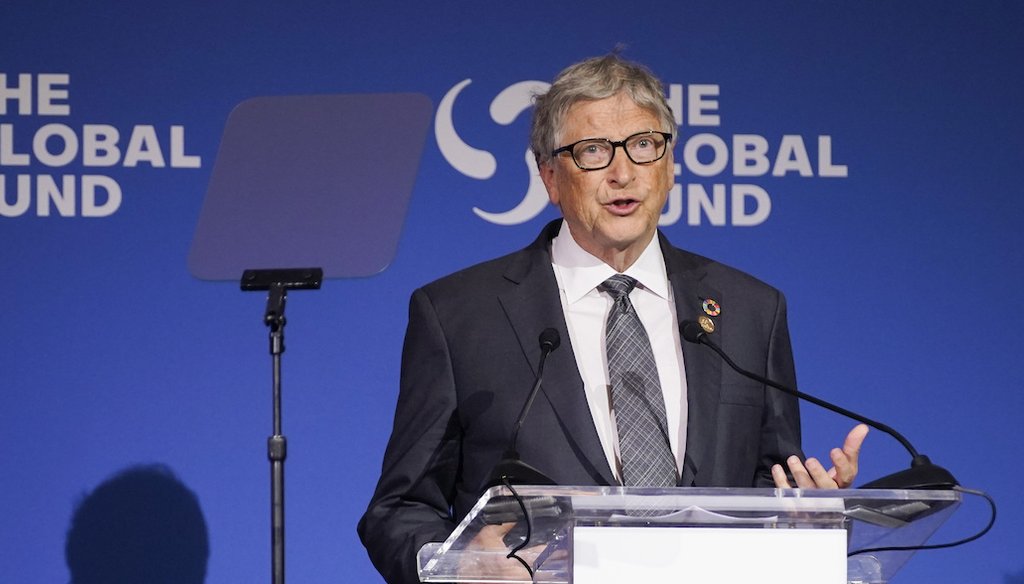

Our only agenda is to publish the truth so you can be an informed participant in democracy.
We need your help.


Bill Gates speaks during the Global Fund's Seventh Replenishment Conference, Wednesday, Sept. 21, 2022, in New York. (AP)
Kenya has a digital ID program, but it does not involve implanting devices into babies.
Video in the post shows a portion of a 2015 interview philanthropist and Microsoft Corp. co-founder Bill Gates gave to a Brussels news site in which he discussed safeguards on genetically modified organisms research. He was not talking about Kenya’s digital ID program.
Kenya’s digital ID program involves physical ID cards and digital ID technology. Babies are assigned ID numbers at birth.
A social media video claimed billionaire Microsoft Corp. co-founder and philanthropist Bill Gates will be leading a charge to implant digital IDs in Kenyan babies.
"Bill Gates will be implanting digital IDs in newborns in Kenya," the Dec. 15 Instagram post said.
But the video misleads on two counts: It misrepresented Kenya’s digital ID program and took an unrelated Bill Gates video clip out of context.
The post was flagged as part of Meta’s efforts to combat false news and misinformation on its News Feed. (Read more about our partnership with Meta, which owns Facebook, Instagram and Threads.)
The video began with a woman discussing Kenya’s digital ID program. The woman erroneously claimed birth certificates in Kenya will be replaced by digital IDs, which are "somehow implanted, somewhere on somebody’s body."
Next, the video showed a clip of Kenya President William Ruto discussing the country’s digital ID program and then showed a clip of Gates saying, "We’re taking things that are genetically modified organisms and we’re injecting them in little kids arms, we just shoot them right into the vein."
The Gates video, however, is from 2015, and he was not talking about Kenya’s digital ID program. He was discussing medical research on vaccines and genetically modified organisms in Africa.
Although Kenya’s digital ID program, Maisha Namba, is real, it does not involve physically implanting IDs into babies at birth.
Kenya has struggled to create a digital ID program, the Center for Financial Inclusion, a Washington, D.C.-based think tank, reported in August. Under the current program, the Kenyan government assigns Kenyan citizens nine-digit digital ID numbers, physical ID cards and digital IDs, using biometrics such as fingerprints. The IDs aim to let Kenyans access online government services more easily and better track payments for government services.
Adult Kenyans can register for the program and newborn babies are issued nine-digit ID numbers at birth. None of the public reporting about the program says it involves implanting babies with physical devices.
Gates’ quote was taken from a 2015 interview with Euractiv, a Brussels news site focused on European policies, about the charitable work he and his then-wife, Melinda Gates, were conducting through the Bill and Melinda Gates Foundation.
The interviewer asked about the safety of genetically modified organisms in African agriculture. Gates compared genetically modified organism safety with research on vaccine safety. He said genetically modified organisms should not be banned outright. But he also said there should be trials and safety measures to ensure the organisms are safe, as there are for vaccines and medicines.
"The strongest analogy is to medicines, and, is there something to worry about with medicines, that is, might some of them have side effects?" Gates said. "Do we need safety testing? And we’re taking things that are genetically modified organisms and we’re injecting them in little kids arms, we just shoot them right into the vein. So, yeah, I think maybe we should have a safety system where we do trials and test things out."
Although the interview was unrelated to Kenya’s digital ID program, the Bill and Melinda Gates Foundation in 2023 advised Kenya on its digital ID rollout, Business Daily Africa reported. The foundation supports creating digital public infrastructure in low-income countries, which includes digital IDs, digital payment systems and data exchange systems.
We rate the claim that Gates is planning to implant digital IDs into Kenya’s newborns False.
Instagram post, Dec. 15, 2024
KBC Channel 1, President Ruto says the National Digital IDs will be ready to be launched by December 2023, Oct. 30, 2023
KICTANet, Understanding Maisha Namba: Kenya’s New Digital Identity System, Nov. 10, 2023
Center for Financial Inclusion, Citizen Experiences with DPI: Kenya’s Digital ID Transition, August 2024
Aratek, The New Kenyan ID Card: Maisha Namba Explained, Nov. 25, 2024
International Society for Human Rights, Kenya’s Maisha Namba Project, accessed Dec. 28, 2024
Euractiv, Bill, Melinda Gates advocate GMOs to a Brussels audience, Jan. 22, 2015
Business Daily Africa, Gates foundation to advise on Maisha Namba rollout, Oct. 15, 2023
Bill and Melinda Gates Foundation, Digital Public Infrastructure, accessed Dec. 28, 2024
In a world of wild talk and fake news, help us stand up for the facts.
